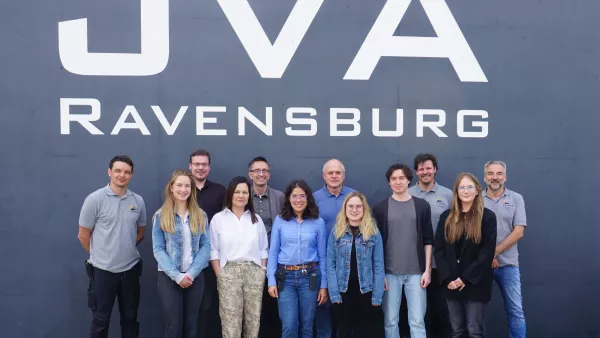
As part of the "Audit" elective of the degree programs Industrial Engineering and Business Administration and Management at RWU, students conducted an internal audit in the areas of quality management and occupational safety at the Ravensburg Correctional Facility (VAW) at the beginning of May 2024. Internal audits are necessary to ensure the recertification of an existing certificate. The prison has had this audit carried out by RWU students for several years now. Unbiased, neutral and with a fresh perspective, they view and evaluate the internal processes from the outside.
This year was no exception. After thorough theoretical preparation at the university, the four students were able to start their practical audit at Ravensburg Prison. Their task was to audit both occupational safety and quality management requirements in the prison's assembly and in-house operations. The group responsible for occupational safety checked, among other things, the handling of hazardous substances, verified their correct labeling and checked equipment requiring monitoring, such as ladders, fire extinguishers and shelving. The QM group was responsible for ensuring quality. Among other things, it examined incoming and outgoing goods inspections, work processes and work instructions. Both groups spoke with individual inmates as well as with the plant service employees responsible for them.
The students learned a lot about everyday life in a prison
In addition to all these tasks, the students also learned a lot about everyday life in a prison. For example, the audit group was allowed to enter different types of cells. They made their way through underground corridors to various assembly plants and ate in the prison canteen. The students saw the prison kitchen where inmates prepare lunch and the rooms for occupational therapy, a special approach to resocialization. The students and their tutors were able to ask any questions they had.
They also learned that the prison work system at the prison consists of two types of operations: Firstly, there are the prison's own businesses, such as a carpentry workshop, locksmith's shop, a paint and varnish shop, a vehicle workshop and a precision engineering business. Inmates also produce items themselves, which can then be purchased in the VAW online store. Training as a carpenter, painter, car mechanic, tool mechanic, electrician or locksmith can also be completed in these in-house and training companies. Qualification modules, forklift courses, cleaning courses and welding courses are short training courses that complement the resocialization concept. There are also assembly companies that act as an "extended workbench". Companies commission certain work there as contract manufacturing.
Building relationships and gaining trust
The second day of the audit took the team to the Bettenreute branch, where the prisoners live and work in open detention, primarily in the woodworking and agricultural sectors. As part of the audit, the group was given a tour of the site and allowed to visit the medieval moated castle. The prisoners normally live there, but renovation work is currently underway. In Bettenreute, the focus is on working with animals. Thomas Hübschle, head of the Bettenreute branch, explained how important this work is: "By working with the animals - such as feeding, milking and caring for them - the prisoners not only learn how to handle them, but also social and emotional skills. If someone has ever been there when a calf is born - that does something to them." The prisoners should learn to build a relationship and gain trust. Communication behavior, the ability to self-reflect, impulse control and empathy skills are often important, says Hübschle. This is where animal-assisted therapy comes in.
Both days ended with a final discussion between the audit team and Jessica Heidenreich, Managing Director of the prison work system, and her staff. The audit report, which the students then write, is part of the examination performance in the "Audit" module and will be made available to the prison once it has been completed. "The two days were an impressive experience for the students and us accompanying them; we gained a deep insight into a different world. We are very grateful to everyone who made this possible here at the prison and supported us," says Ulrike Reck-Obert, a member of the Faculty of Technology and Management and co-organizer of the collaboration between RWU and the prison.